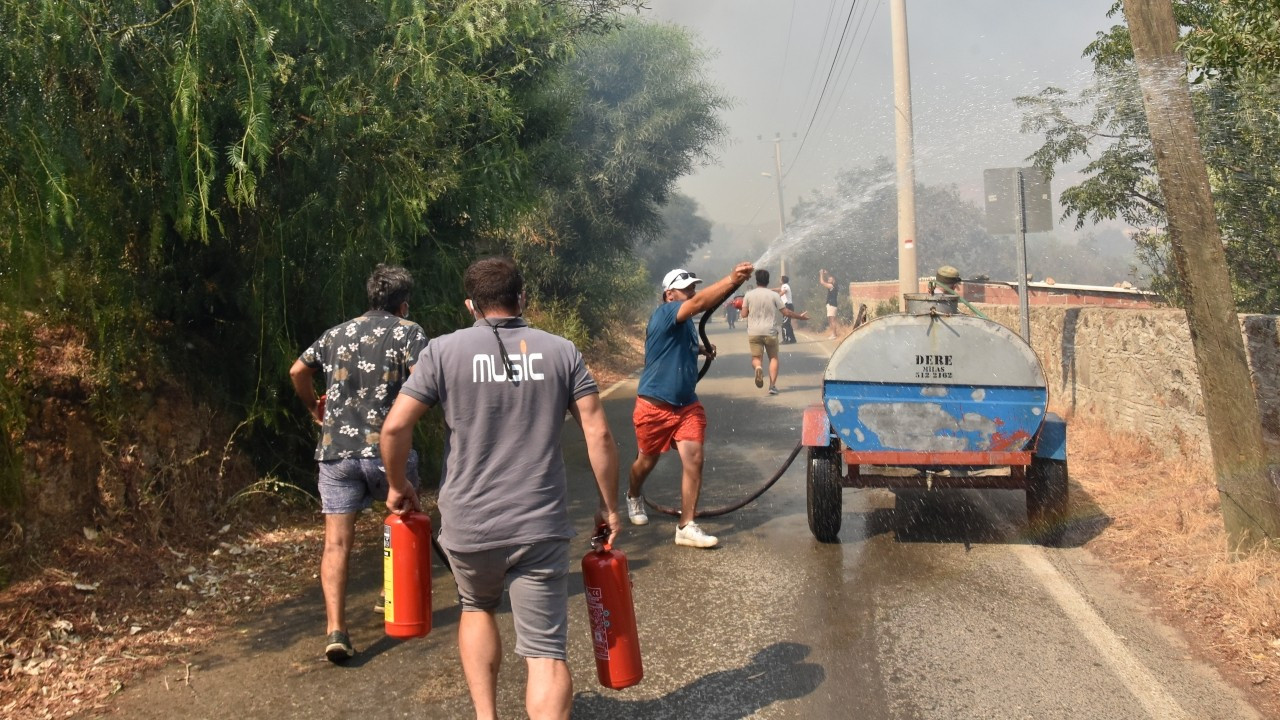Wildfires and AKP's obsession with social media hashtags
The first reflex of Turkey’s current government has been to gag any open and transparent public communication about any crisis the country has faced in recent years. Ensuring that the perception of immaculate and infallible image is maintained has turned into its prime strategic goal.
For a couple weeks now, Turkey and Greece, along with a number of other countries, have been struggling with wildfires. Greek Prime Minister Kyriakos Mitsotakis publically apologized to the public for not being able to immediately handle the fires properly.
On the other hand, President Erdoğan claimed that the Turkish authorities have been very successful in dealing with the issue from its onset. Success might be a relative term, and eventually brave firefighters and thousands of volunteers managed to put the fires under control, but as it has been happening with every crisis in recent years in Turkey, a number of new, societal fires were ignited.
Quickly after the spread of the fires, a columnist at daily Sözcü – Turkey’s most widely read newspaper - wrote about what he believed was the root of the latest disaster and seriously analyzed a historical attempt of foreign powers to alter Turkey’s flora. In the op-ed, he claimed that the natural Anatolian habitat consisted of fig trees and oaks, but that under the Marshall Plan, the United States, for some odd reason, supposedly advised Turkey to change this ecosystem by planting pine trees.
Of course, the piece went into the conspiratorial analysis that the move had to with attempts by foreign powers to undermine Turkey and more than 70 years later, make it more prone to forest fires. As with many trash pieces of this kind, which cater to the most primal human instincts, the debunking of the main premise was only a click away. A simple Google search suffices to uncover that pine trees are a natural flora in Southern Anatolia, and that these specific varieties are commonly known as the Turkish Pine.
This kind of psychosis went well beyond this news article. While Turkish government officials never openly implied that arson was behind the forest fires, pro-government media and pundits had a field day with this conspiracy. Without proof, the government’s unofficial communication team consisting of various media outlets and networks implied that the fires were the result of terrorist attacks and subversions. The insinuations started feeding the public’s paranoia, and quickly, neighborhood patrols were spontaneously formed in order to seek the alleged perpetrators of those heinous crimes. In Muğla and Antalya, these groups armed themselves with sticks and guns and put up checkpoints through which they stopped cars and asked for drivers’ IDs.
Yet, while raging fires engulfed large swathes of the country, the government seemed to be truly bothered by a social media trend. The hashtag “#HelpTurkey” was spontaneously launched on the social median as it would be expected in today’s age for any country experiencing grave and hardly manageable crisis.
Immediately after the hashtag started trend, the head of the Presidential Communications Office Fahrettin Altun, took to Twitter and claimed that “certain groups” had launched this campaign in order to “make Turkey look weak”. In line with the Communication Office’s style, a hashtag war started, and #StrongTurkey and #WeDon’tNeedHelp were launched in an apparent attempt to reinforce Turkey’s self-sustainability and strength to deal with the crisis on its own.
As the government officials played on social media, Turkey’s Agriculture Ministry publicly confessed that Turkey had no firefighting planes in its inventory. Ankara had no choice but rent helicopters and two planes from Russia and Iran. And as it could served as the plot for a cheap thriller, the Russian planes that were sent did not function properly and had to sit at the airport for a few days until they could be serviced. Meanwhile, almost all of Marmaris burned down. The fire abated after a while, simply because there was nothing left to burn.
I had a chance to see the villages that were partially burnt by the fires. The residents of one village told me that when the gendarmeries came to ask them to evacuate their homes, they pretended to evacuate them, hid, and stayed to fight the fires themselves.
They told me they threw soil onto the fires with their spades, which allowed them to save some of their olive trees and houses. Most did not trust that the authorities would do all that was in their power to protect their property. They claimed that the residents in other villages who obeyed and evacuated their homes lost them completely to the fires.
During those visits, I saw a lot of volunteers, before the government banned them from fire areas. They were literally sleeping in the forests, and checking every tree, trying to stop fires from reigniting by putting out even the tiniest spark.
Historically, the Turkish state used to take pride in being a strong, capable and self-sustainable apparatus, always ready to protect its citizens. Even the most liberal Turks agreed that this was likely one positive consequence of traditional Turkish statism. This is why when the administrators of the Turkish state spend more time worrying about social media hashtags and public relations perception than extinguishing raging fires, Turkey’s citizens feel more lost than they should.
The first reflex of Turkey’s current government has been to gag any open and transparent public communication about any crisis the country has faced in recent years. Ensuring that the perception of immaculate and infallible image is maintained has turned into its prime strategic goal.
During this last crisis, people seemed to have been largely left on their own, some trying to save their livelihoods, while others trying to make sense out of bits and pieces of information they managed to gather. For every government truly worried about the public perception this also could be a warning sign that a majority of voters may have the raging fires in their minds next time when they go to the polls.


 Turkey's media watchdog fines broadcaster for calling forest fires 'nightmarish'Politics
Turkey's media watchdog fines broadcaster for calling forest fires 'nightmarish'Politics